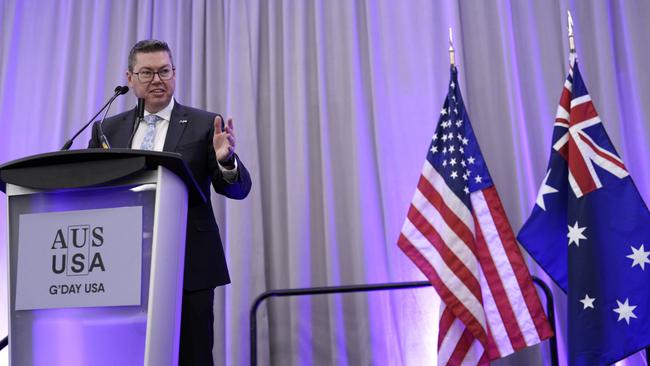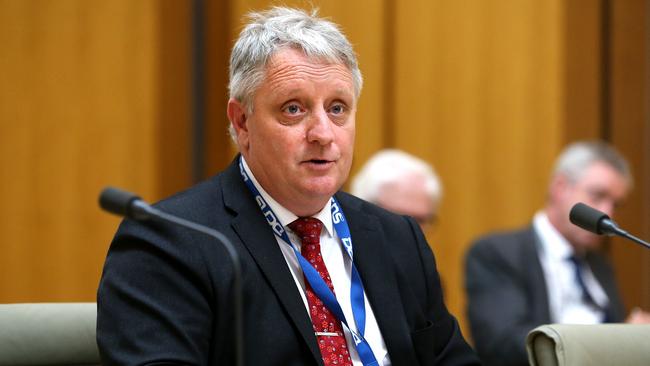Endless red tape slowing down Australia’s defensive efforts
Small defence businesses that are forced to spend hundreds of thousands of dollars navigating endless red tape to deal with the Australian government.
SA News
Don't miss out on the headlines from SA News. Followed categories will be added to My News.
Small Australian defence businesses find it easier to work with the Pentagon in the US than on home soil, Defence Industry Minister Pat Conroy says, as many companies are forced to sink hundreds of thousands of dollars chasing frivolous certifications.
The endless red tape drowning small and medium businesses is hampering Australia’s defensive efforts while the geopolitical situation continues to deteriorate.
Mr Conroy declared the end of peacetime meant the government must take more risks by streamlining certification requirements, which would help accelerate work on crucial defence projects, such as the Hunter-class frigates and the future AUKUS nuclear-powered submarines.
“When I was in the United States (in October), I had a number of Australia defence companies say it was easier to do business with the Pentagon than with their own government – that’s a massive problem,” Mr Conroy told The Advertiser.

He said he was working with Defence to create “simpler and more flexible contracting models”.
“The strategic circumstances dictate that we must take on a bit more risk,” Mr Conroy said.
“We are not in a peacetime scenario where you can just concentrate on reducing risk to zero, which means everything goes slow and we have these fights with a company that employs 15 people about who owns the IP or how we liquidate damages.”
Mr Conroy said Labor would not bother running “sham competitions” for defence projects when there is just one obvious choice of company for the work.
“Let’s work with them, get the best price and make sure they don’t gouge us, but let’s not waste time,” he said.
Defence Teaming Centre boss Audra McCarthy said businesses must invest in a slew of certifications to become “defence ready”.
“Depending on the certification requirements for the projects, companies can spend between $75,000 to $100,000 for each certification,” Ms McCarthy said.
“Then there is the ongoing cost of approximately $15,000 to $20,000 each year to keep this certification current via independent audits.”
In many instances, small businesses will make these investments with no certainty they will successfully break into the defence supply chain. The specific certifications required vary from each project, but mainly involve quality assurance and often cyber security.
Chief executive of the Australian Industry Defence Network, Brent Clark, said the red tape and endless “bureaucracy”, such as frequent audits, placed a huge burden on small businesses with limited resources.

“They don’t have a huge commercial department whose entire job is to sit down and look at defence requirements and understand what they need to do,” Mr Clark said.
“There’s a very fine line between acceptable commercial business decisions and making companies unnecessarily spend money – it’s a very, very fine line to tread.”
Mr Clark explained Defence contracts a major company – often multinational defence behemoths – to take charge of large projects. A range of small businesses specialising in a range of services, such as metal fabrication or electronics, are then engaged by the “prime contractor”.
“That can cause stress because the prime contractor is merely going to pass down the requirements Defence wants and they don’t need to tailor it,” Mr Clark said.
Red tape enshrouding visas is also slowing down the recruitment of highly skilled workers from overseas nations, which will be a key component to assembling a workforce capable of constructing at least eight nuclear-powered submarines in Adelaide.
Babcock Australasia boss David Ruff said he would support “anything that enables the cross flow of people and qualification and experience”.

“The reality is, we need two-way flow of human beings,” Mr Ruff told The Advertiser.
“People with senior, highly qualified leadership positions in the nuclear (and) defence industries are in high demand in their countries.
“So, to attract them here … we need that visa to get those people in, we cannot afford to wait for months and months and months to go through a process when we’ve got a program that is being held up.”
Mr Conroy said work was being done to streamline the visa process, with a special “AUKUS Visa” for defence workers in the US and Britain being considered.
gabriel.polychronis@news.com.au
More Coverage
Originally published as Endless red tape slowing down Australia’s defensive efforts





